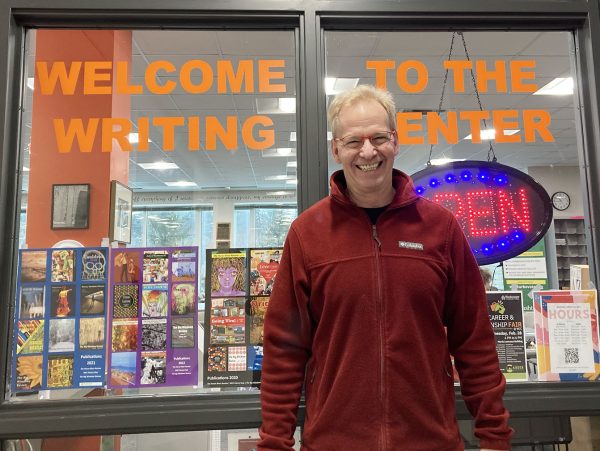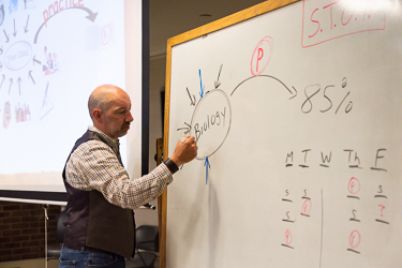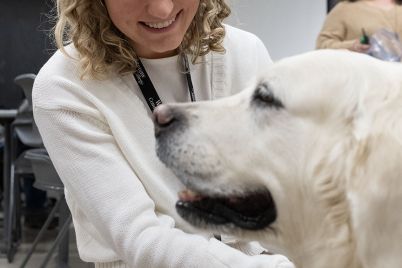
Tom Zimmerman, the faculty adviser for the WCC poetry club, has been in charge of of the organization since 2005. Alice McGuire | Washtenaw Voice
By Alice McGuire
Contributor
For nearly twenty years, Tom Zimmerman has been the face of the Poetry Club at Washtenaw Community College.
“English classes were my favorite throughout grade school and high school–I majored in English; I became an English teacher,” said Zimmerman.
But he wasn’t always a poet.
“I came to poetry–a real love of poetry–a little bit late. I was in my 20s,” he said.
As an avid record collector, Tom relates poetry most closely to music— it was at this point of his life that something about the melody of poetry finally clicked.
While he has always been drawn to the arts, it was the accessibility of tools such as pen and paper and the ease with which one can pick up a book that drew him to revolve his life around literature in particular. That same trait of accessibility and the flexibility which it ensures seems to have enabled the poetry club to form a strong, lasting presence on campus.
“With making music, often you need other musicians, you need to buy instruments, you need to buy music. It’s expensive; it’s cumbersome. With reading, you can get a book and put it under your arm. With writing, it’s pretty cheap, you know? Pen and paper,” Zimmerman said.
Plus, with most students having access to a personal computer of some sort, “accessibility” in writing has come to encompass far more than just pen and paper.
“During COVID, a lot of the Zoom open mics were better attended than face-to-face open mics,” said Zimmerman.
Molly Ledermann, who organizes themed, monthly poetry slams for the club, said that while it was a bit surprising, it made sense given the vulnerability inherent with sharing a poem.
“I think people felt less intimidated,” she said. “There’s no failing. People genuinely want to hear what you have to say.”
In addition to accommodating students who might be anxious, housebound, or otherwise off campus, a change of format means a different experience of the poetry itself.
“I think for a lot of poems, there are really two poems. One is the one that you can hear. And the other one is the one that you can see,” said Zimmerman.
In Zoom slams, technology enables poets and audience members to experience both at once–a benefit usually reserved for the more intimate setting of a club meeting or workshop.
While participants are encouraged to put pen to paper or fingers to keyboard and share their own work, there are options to read and participate if one is a bit shy.
A bulletin board app called “Padlet” was also recently introduced by Ledermann, featuring a selection of poems curated by WCC English faculty, Maryam Barrie.
Of course, there is always the option to sit in silence with one’s camera off. Online or offline, the Poetry Club accommodates a wide range of comfort levels.
Whether one shares their work on stage or keeps it stashed away in their notes app, Zimmerman finds any act of writing to be a valuable act.
“Works of art are sort of a way that we beat death–because we die, and that’s okay–there is a terminus. There’s a clock ticking. Much of the art we admire is created by people who are long dead. But art survives,” Zimmerman said.
“Even journalism–while more utilitarian in its form–that’s something preserved. That’s our species leaving a record that someone was here and cared enough to make something,” said Zimmerman.
The Be Bold, Be Brave 2.0 Poetry Slam is set for Jan. 30 at 11 a.m. in the Richard W. Bailey Library.


